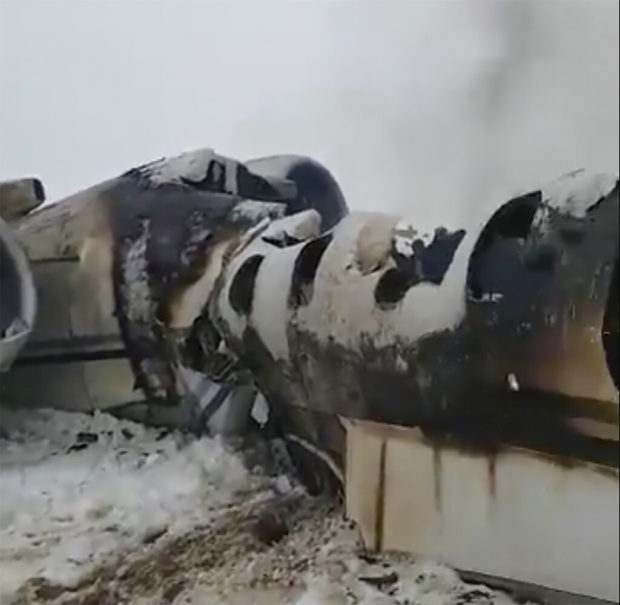Taliban say mystery crash in Afghanistan was US aircraft

This photo provided by Tariq Ghazniwal shows an aircraft that crashed in eastern Afghanistan on Monday. (Tariq Ghazniwal via AP)
KABUL, Afghanistan — A U.S. military aircraft crashed in eastern Afghanistan on Monday, a Taliban spokesman and Afghan journalist affiliated with the militant group said.
A U.S. Army spokeswoman declined to comment on the Taliban claim, but video from the crash site circulating on social media appeared to suggest the aircraft was a U.S. Air Force electronic surveillance plane.
Tariq Ghazniwal, a journalist in the area, said that he saw the burning aircraft. In an exchange on Twitter, he told The Associated Press that he saw two bodies and the front of the aircraft was badly burned. He added that the aircraft’s body and tail were hardly damaged. His information could not be independently verified.
Taliban spokesman Zabihullah Mujahid said a U.S. Air Force plane crashed in the Ghazni province. He claimed the crash killed “lots” of U.S. service members. The militant group often exaggerates casualty figures.
Ghazniwal said the crash site was about 10 kilometers (6.2 miles) from a U.S. military base. Local Taliban have been deployed to protect the crash site, he said, and several other militants were combing the nearby village for two people they say survived the crash.
Article continues after this advertisementThe Taliban control much of Ghazni province and have total control over the local area of the crash.
Article continues after this advertisementGhazniwal said the site was near a village called Sado Khelo, in the Deh Yak district. He also said the crash occurred soon after 1 p.m. local time, but residents in the area did not report a loud crashing noise. He couldn’t say whether the aircraft had been shot down but “the crash was not loud.”
U.S. Army Maj. Beth Riordan, a spokeswoman for U.S. Central Command, declined to comment when told about the Taliban claim. She earlier acknowledged American military officials were investigating reports of a crash in Afghanistan. She said that it remained unclear whose aircraft was involved in the crash.
Riordan declined to immediately comment further.
However, pictures on social media purportedly from the crash site showed what could be the remains of a Bombardier E-11A aircraft, which the U.S. military uses for electronic surveillance over Afghanistan.
Images on social media purportedly of the crashed plane showed an aircraft bearing U.S. Air Force markings similar to other E-11A surveillance aircraft photographed by aviation enthusiasts. Visible registration numbers on the plane also appeared to match those aircraft.
The so-called Battlefield Airborne Communications Node can be carried on unmanned or crewed aircraft like the E-11A. It is used by the military to extend the range of radio signals and can be used to convert the output of one device to another, such as connecting a radio to a telephone.
Colloquially referred to by the U.S. military as “Wi-Fi in the sky,” the BACN system is used in areas where communications are otherwise difficult, elevating signals above obstacles like mountains. The system is in regular use in Afghanistan.
Local Afghan officials had said earlier on Monday that a passenger plane from Afghanistan’s Ariana Airlines had crashed in the Taliban-held area of the eastern Ghazni province. However, Ariana Airlines told The Associated Press that none of its planes had crashed in Afghanistan.
The conflicting accounts could not immediately be reconciled. The number of people on board and their fate was not immediately known, nor was the cause of the crash.
Arif Noori, spokesman for the provincial governor, said the plane went down around 1:10 p.m. local time (8:40 a.m. GMT) in Deh Yak district, some 130 kilometers (80 miles) southwest of the capital Kabul. He said the crash site is in territory controlled by the Taliban. Two provincial council members also confirmed the crash.
But the acting director for Ariana Airlines, Mirwais Mirzakwal, dismissed reports that one the company’s aircraft had crashed. The state-owned airline also released a statement on its website saying all its aircraft were operational and safe.
The mountainous Ghazni province sits in the foothills of the Hindu Kush mountains and is bitterly cold in winter. The Taliban currently control or hold sway over around half the country.
The last major commercial air crash in Afghanistan occurred in 2005, when a Kam Air flight from the western city of Herat to Kabul crashed into the mountains as it tried to land in snowy weather.
The war, however, has seen a number of deadly crashes of military aircraft. One of the most spectacular occurred in 2013 when an American Boeing 747 cargo jet crashed shortly after takeoff from Bagram airbase north of Kabul en route to Dubai in the United Arab Emirates. All seven crew member were killed. The U.S. National Transportation Safety Board investigation found that large military vehicles were inadequately secured and had shifted during flight, causing damage to the control systems that “rendered the airplane uncontrollable.”